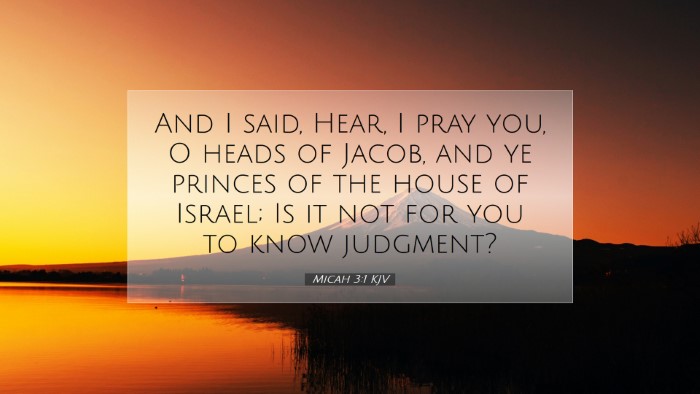Old Testament
Genesis Exodus Leviticus Numbers Deuteronomy Joshua Judges Ruth 1 Samuel 2 Samuel 1 Kings 2 Kings 1 Chronicles 2 Chronicles Ezra Nehemiah Esther Job Psalms Proverbs Ecclesiastes Song of Solomon Isaiah Jeremiah Lamentations Ezekiel Daniel Hosea Joel Amos Obadiah Jonah Micah Nahum Habakkuk Zephaniah Haggai Zechariah MalachiMicah 3:1
Micah 3:1 KJV
And I said, Hear, I pray you, O heads of Jacob, and ye princes of the house of Israel; Is it not for you to know judgment?
Micah 3:1 Bible Commentary
Commentary on Micah 3:1
Bible Verse: Micah 3:1 - "And I said, Hear, I pray you, O heads of Jacob, and ye princes of the house of Israel; Is it not for you to know judgment?"
Introduction
The prophet Micah, a contemporary of Isaiah, addresses the leadership of Israel in this poignant verse. This remark calls attention to the moral and spiritual failures of the leaders, the “heads of Jacob” and the “princes of the house of Israel,” who were expected to guide the people according to God's law but instead operated under the principles of corruption and injustice.
Exegesis and Theological Insights
-
Call to Accountability:
Micah opens with a direct appeal to the civil and spiritual leaders of Israel. This call to “hear” emphasizes the urgent need for them to listen and reflect on their actions and the consequences of their governance. Matthew Henry underscores that leaders ought to know the responsibilities placed upon them, given their positions of authority.
-
The Nature of Judgment:
The term “judgment” in this context refers not merely to legal matters but to a deeper moral and ethical understanding that encompasses the entirety of God's law. Albert Barnes highlights that the leaders were remiss in their duties; they failed to administer justice that reflects God's character and holiness. This neglect amounted to a severe dereliction of their responsibilities.
-
The Implication of Their Roles:
As leaders, they are expected to represent God's justice. Micah's rhetorical question implies a profound disappointment in their failure, revealing the moral decay that has infiltrated every level of society. Adam Clarke notes that leadership carries a weighty burden, one that is intertwined with the spiritual wellbeing of the people they govern. Thus, they are called to be not only figures of authority but also stewards of divine order.
Historical Context
Understanding the historical backdrop to Micah's prophecy enhances our comprehension of this verse. The economic disparity, social injustice, and ethical lapses prevalent during Micah's time created a fertile ground for condemnation against the leaders. Matthew Henry notes that these injustices not only affected the populace but also distorted the nation's covenant relationship with God, making the leaders culpable for the collective sin of Israel.
Practical Implications for Contemporary Leadership
The message of Micah 3:1 transcends time and culture; it serves as a compelling exhortation for modern leaders—whether in the church, government, or communities. The pitfalls of greed, corruption, and moral ambiguity are perennial challenges that require leaders to prioritize humility, integrity, and justice.
-
Restoration of Integrity:
Just as Micah called out the injustices of his time, current leaders must engage in self-reflection and repent where necessary, recognizing that their actions have far-reaching impacts.
-
Responsibility in Judgment:
Today’s leaders should echo Micah’s reminder that they hold the mantel of responsibility. Their governance should embody the essence of God's justice—one that protects the vulnerable and maintains moral order.
Concluding Reflections
Micah 3:1 serves as both a warning and an exhortation. The prophetic voice cries out against complacency and encourages a return to just leadership. As Albert Barnes aptly states, understanding and executing judgment is not just a duty; it is a reflection of one’s character before God. Thus, for pastors, students, theologians, and scholars, this verse encapsulates a crucial principle: true leadership is synonymous with responsibility, guided by the principles of God's divine justice, mercy, and humility.


